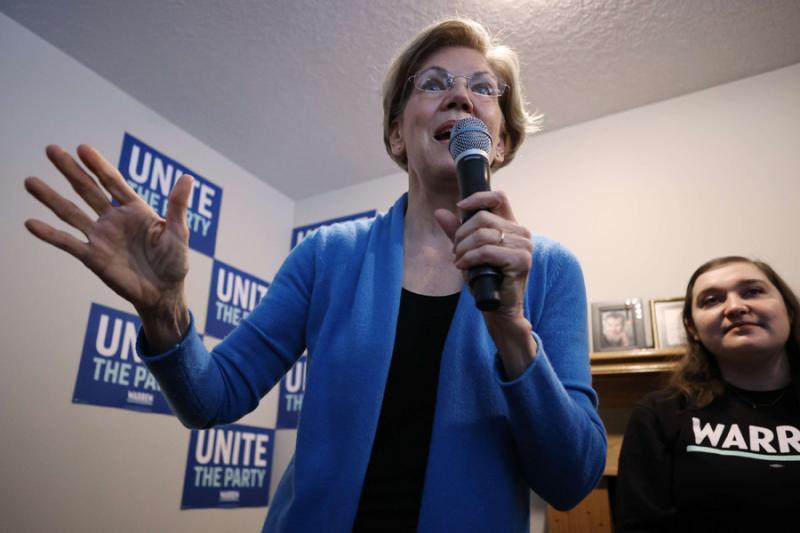Iowa caucuses show Middle East issues matter
After the results of all 99 counties are tabulated, the Iowa caucuses are supposed to offer a clarifying moment for the United States and the wider world.

Elizabeth Warren rallies volunteers before they go out to canvas in Urbandale, Iowa, February 01. (AFP)
On February 3, Iowa, a predominantly rural state in the American Midwest, kicks off the US presidential primary season. Across the state, Iowans will caucus, which is to say approximately 1,700 meetings will take place in church basements, fire stations, school gymnasiums and even around kitchen tables.
Each meeting will break into disparate groups for their preferred presidential candidate and the supporters counted. After the results of all 99 counties are tabulated, the Iowa caucuses are supposed to offer a clarifying moment for the United States and the wider world.
In theory, Iowa is meant to provide a good early indicator of a presidential candidate’s strength, as well as issues that really matter, as the race for the White House grinds on to Election Day November 3. However, 2020 seems different. A recent poll indicated an unusually high degree of uncertainty among Iowans, with approximately 40% of respondents saying they were still unsure of their candidate.
In casual conversation, Iowans admit to varying levels of doubt and confusion about the crowded Democratic field’s “electability,” a code word for the ability to defeat US President Donald Trump.
Do Iowans — with their unique, first-in-the-nation contest — care about US foreign policy, its many wars and its footprint in the Middle East? Does that factor into a candidate’s electability?
“Yes,” said Scott Punteney, chairman of the Pottawattamie County Democratic Party, one of Iowa’s larger counties by geographical area and heavily targeted by all the leading Democratic candidates, including former US Vice-President Joe Biden, Senators Bernie Sanders, Elizabeth Warren and Amy Klobuchar and former South Bend, Indiana, Mayor Pete Buttigieg.
“People have been asking the candidates questions about the nuclear agreement with Iran because people are worried about it and people are concerned about peace between the Palestinians and Israelis, though that seems a very long shot,” Punteney said.
He doesn’t say so but the Middle East — or at least, fear of another war in the Middle East — may loom rather larger in Iowans’ subconscious than generally acknowledged. Four years ago, just before the Iowa caucuses, Trump arrived in Dubuque, a city in the east of the state, which borders two other electorally key states, Illinois and Wisconsin.
Promising to pull the United States out of its endless wars, Trump said: “I’m the guy that didn’t want to go to war.” It was an inaccurate reference to Trump’s stance on the 2003 Iraq invasion but he insisted he had always thought “it’s just unjust, it’s a mess.”
He went on to promise that the US military would always be “so strong, so powerful that nobody is going to mess with us anymore” and that the United States did not, in any case, need to be engaged in “reckless, interventionist globalism.”
Dubuque County had not voted Republican since 1956. In November 2016, it voted for Trump. He also broke through the Democrats’ so-called “blue wall” of solid support in Michigan, Wisconsin and Pennsylvania by a small 77,000-vote margin.
A study by Douglas Kriner of Cornell University and Francis Shen of the University of Minnesota Law School stated that was largely because Trump received support from counties that had sent more sons and daughters to war in the years since 9/11 than other sections of the United States.
“The parts of the country that have seen this war most intensely — they were looking for someone who would end the damn wars,” Shen said, “and in Trump they found someone who at least told them that’s what he would do.”
It’s not certain that Trump is seen as a peacenik anymore, with tensions escalating over Iran and his having unveiled a “peace plan” that unfairly privileges the Israelis.
A few weeks ago, James Zogby, founder and president of the Arab American Institute, spoke in Iowa City about the importance of the caucuses to Arab Americans and, by extension, to the wider Arab world. Zogby suggested that with Arab Americans continually battling bigotry, the Iowa caucuses should hold candidates accountable on issues important to the community.
He added that such a strategy should influence the election process across all states, particularly because the outcome of the November 3 national vote will shape domestic and foreign policy concerns critical to Arab Americans. This seems to make sense.
For all the criticism of Iowa being too white and too homogenous to be properly representative of 21st-century America, the state does sit geographically and politically in the middle of the country. Anything that works in Iowa could potentially be rolled out in either direction. Iowa shows that foreign policy matters profoundly at home.
Originally published in The Arab Weekly

